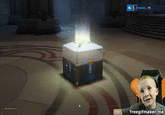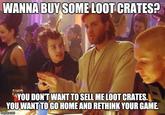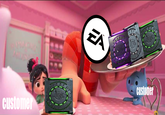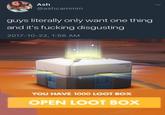Loot Boxes
This submission is currently being researched & evaluated!
You can help confirm this entry by contributing facts, media, and other evidence of notability and mutation.
About
Loot Boxes are a product in video gaming which players can purchase in addition to their games which will offer randomized virtual items ranging from cosmetic changes to player upgrades. They have been highly criticized by consumers of AAA video games, as certain developers have implemented loot boxes in full-price games and highly incentivize the player to purchase them in order to complete the game. They have been recognized as an illegal form of gambling in several countries.
History
Loot Boxes have their origin in MMO games.[1] The first game to implement a loot box system was ZT Online, a Chinese free-to-play game. The loot box was developed as a way to monetize the game while understanding many Asian players would likely pirate the game. The success of the concept led other games to implement a micro-transaction system, where games would be released for free but a player could upgrade by purchasing items with real currency for the game. Team Fortress 2 was the first game to introduce loot boxes in North American and European regions, which it did after becoming free-to-play. The system became much more popular with the popularity of Overwatch, which offered players a loot box when they earned a new level of experience, or have players purchase a loot box with a microtransaction. Following the release of Overwatch, AAA titles including Call of Duty, Halo 5 Guardians, Battlefield, and League of Legends implemented loot box systems.
Controversies
Loot boxes have been criticized as contributing to a compulsion loop that amounts to gambling addiction. The rush of seeing what comes from a random loot boxes has been compared to the feeling one gets when pulling a slot machine. Additionally, there are concerns that children who play these games could be influenced to take part in microtransactions without restriction. Several games have been criticized for implementing micro-transactions as a "pay-to-win" strategy, including games like Hearthstone and Middle Earth: Shadow of War.
Star Wars: Battlefront II
The loot box system was intensely criticized when it was implemented in Star Wars: Battlefront II. In Star Wars: Battlefront II, loot boxes were initially devised as a device for players to purchase that would offer statistical upgrades to their character, leading to intense criticism from fans who felt this was clearly an advantage for players who were willing to purchase multiple loot boxes. EA initially attempted to placate fans by making the loot box advantages through gameplay means, but the amount of gameplay it took to get those achievements still favored players who were willing to engage in the "pay-to-win" system. This led the Belgium Gambling Commission to evaluate if the system in Battlefront II constituted gambling, and several U.S. states mulled banning the sale of the game. EA lost 8% of its stock a week after release.
Paladins Cards Unbound Loot Box Controversy
Paladins Cards Unbound Loot Box Controversy refers to the online backlash directed toward video game developer Hi-Rez Studio for introducing a pay-to-win style loot box system to their free-to-play multiplayer shooter Paladins: Champions Of The Realm, echoing many of the criticisms used against the system used in Electronic Art's Star Wars: Battlefront II.
On November 29th, 2017, the Paladins by Hi-Rez Studios YouTube channel uploaded a developer update video after their OB 64 Patch notes stream announcing Cards Unbound, a new card leveling system that will replace the old card systems points distributing system into a leveling system (shown below). In the video, lead designer HiRezMartini revealed that players would be required to unlock loot chests and acquire duplicates of cards in order to level them up to gain higher level buffs and stat increases. They also announced that their Casual play mode will be replaced with a quickplay mode which allows no limits on cards, while also making their ranked game mode restrict all cards to all players at level 3 regardless of a players card level. The patch is available in the public test servers for players to give feedback and allow changes for the week before the patch goes live on Wednesday December 6, 2017. Hi-Rez also announced that any purchases of the lootboxes to upgrade cards will only be purchasable with in game gold currency and not allow players to purchase it with their premium currency until they feel that the system is balanced for micro transaction purchases.
Shortly after the announcement, the Paladins community on both The Paladins forums and the r/Paladins subreddit did not hesitate to voice out against the new changes to the card system, saying that this will cause a lot of unfair advantages to both newer and older players of the game. Paladins Cards unbound was also front paged on the r/gaming and /r/pcgaming forums and has even drawn the attention of various media outlets such as IGN, PC Gamer, Kotaku and Eurogamer.
International Rulings
Loot boxes have been ruled illegal in several international courts, including the Netherlands and Belgium. Other European countries including England, France, and Germany have considered or are currently considering the legality of loot boxes.
Belgium's Potential EA FIFA Lawsuit
After Belgium ruled loot boxes illegal, Electronic Arts did not remove the system from games released there as other publishers did. On September 10th, local Belgium paper Metro[2] reported that the EA had not removed loot boxes from recent FIFA titles, and the Belgian gaming commission referred the matter to the country's public prosecutor office.[3] Arstechnica suggested that EA may be eager for the case to go before a judge to argue that the loot boxes in FIFA are not a form of gambling. EA CFO Andrew Wilson has said that the loot boxes don't qualify "because players always receive a specified number of items in each pack, and secondly we don't provide or authorize any way to cash out or sell items or virtual currency for real money."









Display Comments